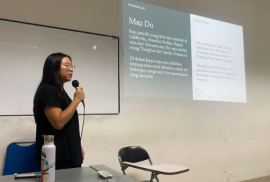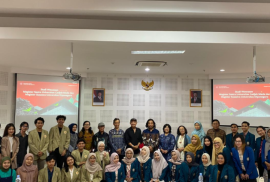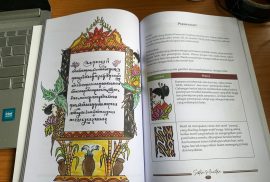Yogyakarta, November 29, 2025 – Efforts to strengthen the Korean Studies ecosystem in Indonesia have entered a new phase with the hosting of the INAKOS Seminar titled The Role of INAKOS in Reinforcing Korean Studies in Indonesia on Saturday, November 29, 2025, at the Soegondo Building Auditorium, Faculty of Cultural Sciences (FIB) UGM. Organized by The International Association for Korean Studies in Indonesia (INAKOS) in collaboration with the Korean Language and Culture Study Program at FIB UGM and the Korea Foundation, the event marked an important milestone in revitalizing INAKOS as a center for academic collaboration and research development in Korean Studies in Indonesia.
In his opening remarks, the Dean of FIB UGM, Prof. Setiadi, reaffirmed the faculty’s commitment to strengthening the East Asian studies ecosystem.
“We are preparing proper infrastructure to support East Asian studies. The building next to this one is fully dedicated to academic study centers, one of which is Inakos. We aim for all research centers at FIB to be integrated within a multidisciplinary and transdisciplinary environment,” he stated.
Support was also expressed by the Director of the Korea Foundation, Lee Sanghoon, who highlighted the strategic role of INAKOS as an academic bridge between Indonesia and Korea.
“The Korea Foundation fully supports Inakos in revitalizing academic spaces and dialogue for scholars with deep interests in Korea. We believe Inakos will play an important role as a bridge in strengthening Korean Studies in Indonesia,” he said.
Meanwhile, Acting Ambassador of Korea to Indonesia, Park Soo-deok, emphasized the importance of strengthening cross-national collaboration through research and academic dialogue.
“Indonesia and Korea have a long history of cooperation in culture and education. Through research, academic exchange, and scholarly dialogue such as today, both countries continue to build stronger bridges of mutual understanding,” he noted.
On the same occasion, the 2025 President of INAKOS, Suray Agung Nugroho, presented the strategic direction of the newly reactivated organization. He emphasized that INAKOS serves as a home, space, and academic umbrella to unite scholars and observers of Korean Studies in Indonesia, as well as to enhance collaborative and sustainable research.
Following the opening remarks, the audience was treated to a performance of the Korean Fan Dance, presented through a collaboration by students from the Korean Language and Culture Study Program at FIB UGM. The program continued with academic presentations by speakers from UGM, UI, UPI, and Universitas Nasional.
The first presentation was delivered by Rostinue from the University of Indonesia, who explained the role of Korean Studies scholars as academic and cultural bridges that strengthen bilateral interactions between Indonesia and Korea. The next speaker, Ashanti Widyana from the Indonesia University of Education (UPI), presented research trends in UPI’s Korean Language Education Program from 2020 to 2025, focusing on strengthening applied linguistics research, cultural studies, and integrating research outcomes into educational practice.
The session continued with Desitha Dwi Asriani from FISIPOL UGM, who discussed body modification and gender performativity among young Asian men and women from a comparative Indonesia–Korea perspective. The next presentation, by Rurani Adinda from Universitas Nasional, explored differences in the meanings of idioms related to the head in Korean and Indonesian. The final speaker, Achmad Rio, Head of the Korean Language and Culture Study Program at FIB UGM, delivered a talk on analyzing translation patterns of the adnominal ending deon-eass-does using a Korean–Indonesian parallel corpus.
This seminar is expected to serve as an initial step in expanding academic networks in Korean Studies in Indonesia, while strengthening academic contributions to cultural, social, and educational cooperation between Indonesia and Korea. Continued collaboration will open broader spaces for dialogue and encourage innovative scholarly work that benefits society and advances knowledge.
In the long term, this initiative is expected to enhance access to knowledge and opportunities for academic exchange, contributing to human development and a more inclusive and sustainable future for both countries.
[Public Relations of FIB UGM, Candra Solihin]






